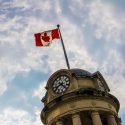I grew up living in a townhouse on the corner of a street predominantly populated by immigrants and refugees. My parents, immigrants themselves, found comfort living closely to others that shared life experiences similar to their own. Across the street from my home was the oasis of my childhood: two trailers hitched together creating a makeshift community center, a swing set, and a basketball court with precariously dangling mesh.
Every Friday evening my mother would host a casual dinner party in our home for a dozen of her friends, a community affair of sorts. And every Friday I found myself tiptoeing stealthily past the congregation – enlisting all the covert maneuvers a fourth grader could muster – to make an exit without making a scene. Getting caught meant enduring the most unfavorable of fates: exchanging pleasantries with a room full of cackling women and a dozen wet kisses planted on each of my cheeks. Besides, I could hardly wait to reach my oasis.
My closest friends all grew up in similar townhouses on the same street. We grew up children of immigrants and refugees, although that never defined us, not back then at least. Every Friday evening our mothers would gather under a single roof, pouring cups of scented herbal teas and sharing conversations by the spoonful. And every Friday evening my friends and I would gather under the roof of our community center, exchanging coloring utensils and sharing bewildering anecdotes.
Back then we all knew each other by name, the old and the young. We were bound by an unspoken desire to recreate the communities we had lost in past lives, in past worlds. Every smiling face was a gentle reminder that we belonged to something far greater than ourselves.
A decade later I find myself living in a semi-detached house on the corner of a suburban street predominantly populated by strangers. I have since outgrown my oasis, and have replaced it reluctantly with public transit and part-time jobs. Our neighbors don’t know our names; we have yet to exchange pleasantries in all the years that I’ve lived here.
This is not a street of immigrants. Perhaps we are alone in our migrations. This street is lined with polished homes, mowed lawns and closed doors. The subdued silence of Friday evenings is a chronic reminder of my dwindling sense of community.
But what exactly is community? I ask this only because I seek it everywhere I go. Perhaps my definition of community was naïvely conflated with the carefree joys of childhood. Perhaps there is far more to community than shared meals, wet kisses and makeshift community centers.
The community I knew was built on shared smiles and shared sacrifices. It embraced our collective differences and thrived off of a mutual commitment to care for, and protect one another. My community was the safest place in the world, where no one was ever made to feel like a stranger.
Maybe a community is defined by none of these things. Maybe it is defined by all of them. The only thing I know for certain is that I am forever indebted to my community for making me the person that I am, and I can hardly wait to find my oasis again.




Leave a Reply